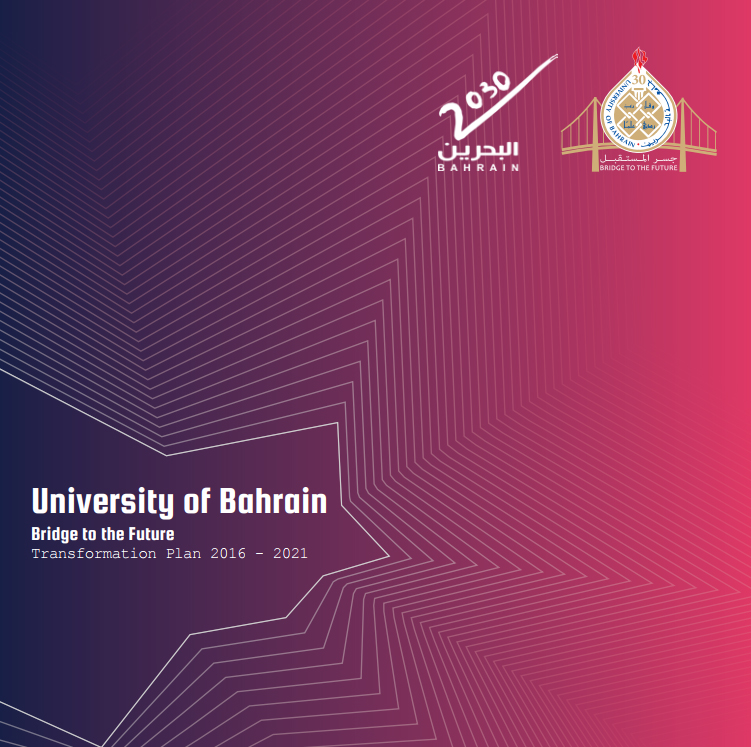 “The region is facing economic pressures triggered by falling oil prices that has filtered through to public sector spending, and therefore increasing the focus on private sector growth as the engine of new jobs and opportunities. With one third of Bahrain economy within the oil and gas sector and public sector, the drive to diversify and create a sustainable economy is a national priority and the essence of the 2030 vision. This vision can only be achieved by having knowledgeable and skilled human capital that can adapt to the rapidly changing regional and global environment. Economic growth and community expectations will encourage the University to rethink its approach not just towards students but also towards faculty and staff members, industry, society and stakeholders in terms of brand, marketing and international profile. New and emerging technologies are changing not only the way that education is being delivered by universities but also how economic sectors operate to cope with the change in business model that are becoming more digital. As the national university of the Kingdom of Bahrain, we cannot afford to be reactive to the ever-changing external environment, instead we must be at the cutting edge of regional and global challenges and opportunities through being agile and dynamic. At the same time, we must review current funding models and assess what alternative options exist to create a financially sustainable future for the University. It is, however, an exciting time to be President of the University of Bahrain (UOB) and to be part of the transformation of teaching and learning. Today’s educators must meet the needs of a new generation of learners, aspiring to thrive and contribute in an increasingly interconnected world. This provides new challenges for academics who must constantly evolve and innovate to meet the changing needs of academia and millennial learners. The launch of this transformation plan will propel our University into the next phase of development, to make us stronger, more flexible and more responsive. We will increase our focus on internationalization to create global citizens, develop our relations with industry, widen our academic offer and produce research that has regional impact that becomes our signature. The strategic roadmap highlights our aspirations and this will act as a framework for colleges and centers to develop their plans to align with that of our goals. Finally, in order to prosper, Bahrain must be relevant to the world through its high-quality graduates and our impact on the economy, society and public services. To achieve this, the University of Bahrain must be exceptional and that can only be achieved by our collective efforts, focus and determination.” Prof. Riyad Yousif Hamzah, President of the University of Bahrain.
“The region is facing economic pressures triggered by falling oil prices that has filtered through to public sector spending, and therefore increasing the focus on private sector growth as the engine of new jobs and opportunities. With one third of Bahrain economy within the oil and gas sector and public sector, the drive to diversify and create a sustainable economy is a national priority and the essence of the 2030 vision. This vision can only be achieved by having knowledgeable and skilled human capital that can adapt to the rapidly changing regional and global environment. Economic growth and community expectations will encourage the University to rethink its approach not just towards students but also towards faculty and staff members, industry, society and stakeholders in terms of brand, marketing and international profile. New and emerging technologies are changing not only the way that education is being delivered by universities but also how economic sectors operate to cope with the change in business model that are becoming more digital. As the national university of the Kingdom of Bahrain, we cannot afford to be reactive to the ever-changing external environment, instead we must be at the cutting edge of regional and global challenges and opportunities through being agile and dynamic. At the same time, we must review current funding models and assess what alternative options exist to create a financially sustainable future for the University. It is, however, an exciting time to be President of the University of Bahrain (UOB) and to be part of the transformation of teaching and learning. Today’s educators must meet the needs of a new generation of learners, aspiring to thrive and contribute in an increasingly interconnected world. This provides new challenges for academics who must constantly evolve and innovate to meet the changing needs of academia and millennial learners. The launch of this transformation plan will propel our University into the next phase of development, to make us stronger, more flexible and more responsive. We will increase our focus on internationalization to create global citizens, develop our relations with industry, widen our academic offer and produce research that has regional impact that becomes our signature. The strategic roadmap highlights our aspirations and this will act as a framework for colleges and centers to develop their plans to align with that of our goals. Finally, in order to prosper, Bahrain must be relevant to the world through its high-quality graduates and our impact on the economy, society and public services. To achieve this, the University of Bahrain must be exceptional and that can only be achieved by our collective efforts, focus and determination.” Prof. Riyad Yousif Hamzah, President of the University of Bahrain.
Iconic One Theme | Powered by Wordpress
